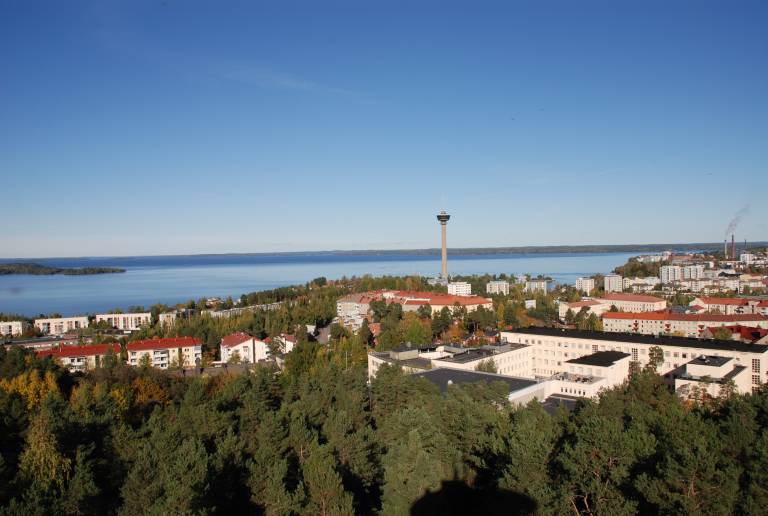The SAFER Master’s program was established in 2019 to meet the growing demand for experts in the security sector. The program has already had five successful years at the Faculty of Management and Business at Tampere University. Numerous security governance professionals have graduated from the program and currently work in demanding expert positions in the security sector, both in the private, public and third sectors, in Finland and internationally.
In the fall of 2025, a new specialization option on International Security will be established in the programme. The contents of the continuing Security Governance specialization option are also currently being updated and developed. The program is also being renewed in terms of its joint studies, so that in the future, in addition to disciplinary-based courses, practical work-life relevant contents will also be emphasized in the curriculum.
From the fall 2025 onwards the programme is re-named as Master’s Degree Programme in Security Management and Politics.
The combination of Security Governance and International Security forms a coherent whole, yet at the same time broad enough programme with a multidisciplinary focus on security studies. In the newly established International Security specialization, the emphasis will be on International Security Studies, Strategic Studies and related analytical skills, as well as contents focusing on issue areas like crisis management and environmental security.
The resulting multidisciplinary English-language master’s program in Security Studies, combining the fields of administrative sciences and international politics, is nationally and regionally unique given its broad and multidisciplinary scope.
The next intake to the programme will be in fall 2025 (both tracks). The application period will start in December 2024 and end in January 2025. Depending on their major, future SAFER students graduate either with the Master’s Degree in Administrative Sciences (Security Governance track) or with the Master’s Degree in Social Sciences (International Security track). The two majors have their own admission and degree requirements. Details on the curriculum, application process and admission criteria will be published in fall 2024.
Growing need for experts in international security and security governance
The foundation of both national and international security is undergoing significant transformation both regionally in Europe and globally. Challenges such as climate change, the use and potential proliferation of weapons of mass destruction, the strengthening of antibiotic resistance, pandemics, and the management of existential risks related to artificial intelligence increasingly require experts who have a broad understanding of international security and its governance that is characterized by cross-boundary complexity.
At the same time, the distinction between societal/internal security and international security is increasingly interconnected and fuzzy, especially in the context of hybrid threats and creeping crises. Additionally, more traditional concerns related to the use military force and the threat of coercion through military action have also intensified, both globally and in Europe. To deeply understand these questions and address the associated challenges, we need more experts who can integrate knowledge from public administration and international security research. Finland and Sweden joining NATO provide a concrete example of the growing demand for international expertise and competence, even at the national level.
The major in International Security leads to the degree of Master of Social Sciences and is aimed at students who hold a suitable Bachelor’s degree in social sciences. Students majoring in International Security develop expertise to operate within the complex environment of global, regional and national security governance and politics. The International Security specialization provides you with theoretical and practical understanding on strategy, foreign policy, geopolitics/geoeconomics, crisis management and environmental security. The degree programme in politics educates innovative professionals with rigorous analytical skills needed to work in public organisations, private sector, non-governmental organisations as well as in international organizations. In addition, students in the field also have good employment prospects in the media sector and in tasks related to strategic communication, security consulting, including third-sector NGO actors.
The major in Security Governance leads to the degree of Master of Science in Administration and is aimed at students who hold a suitable Bachelor’s degree in social sciences. Students who major in Security Governance develop expertise in governance, leadership and management of security in international, national and local security environments, in security organisations, public agencies and in the third sector. The security governance specialisation provides you with the tools to understand, analyse, and develop societal, organizational, and managerial practices in hybridized society. You will be trained as an expert to solve complex societal problems. The degree program in administrative science is versatile and offers a wide range of career opportunities in both the public and private sectors.
Cutting-edge research and work life relevancy
The increasing need for expertise in both national and international security has been recognized in closely related ministries, international organisations, business sector, and non-governmental organisations. The demand for knowledge and expertise within the field has grown both nationally in Finland and internationally.
The academic staff responsible for the International Security track in the unit of Political Science and International Relations have extensive networks and connections with key players in the field, including ministries, administration, research institutions, and some central international organizations. At the regional level, a natural stakeholder network is formed by companies and other actors in the Pirkanmaa region, with whom the SAFER program has previously collaborated.
The academic staff responsible for the Security Administration study track have functional cooperation and relationship with national educational institutions and authorities under the Ministry of the Interior. The unit of Administrative Sciences has comprehensive national cooperation networks across all levels of administration and with international organizations. The Administrative Sciences unit has conducted numerous security assessments and crisis management-related studies.
Work-life connections are also considered in the program’s teaching and tutoring. In addition to optional internship period and available faculty internship support, the program’s structure will include contents that combine academic research to practical case studies and problem-solving from the perspectives of both program areas. Such content is designed to be integrated across program courses and separately in a case study course focused on practical problem-solving, where expertise from stakeholders is also leveraged.
More information from MAB Faculty Study Services:
- https://www.tuni.fi/en/about-us/faculty-management-and-business#switcher-trigger-education
- mab.opiskelu.tau@tuni.fi
See also: TASERR – Tampere Centre for Security, Risk, and Resilience





